Best Guitar Amplifier
Best Overall Guitar Amplifier
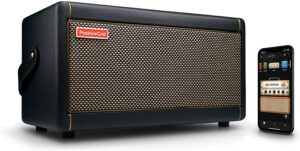
Best Acoustic Electric Guitar Amplifier
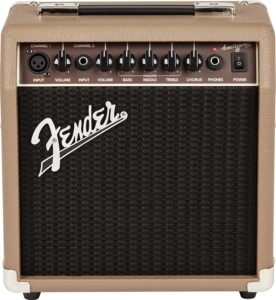
Best Electric Guitar Amplifier
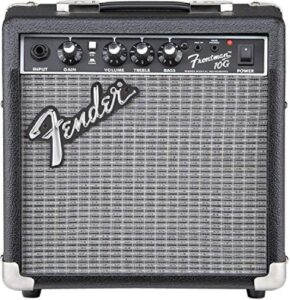
Best Wireless Guitar Amplifier
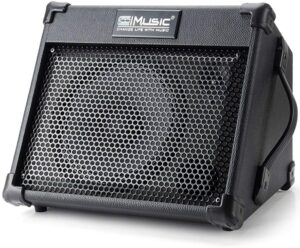
Best Practice Amplifier
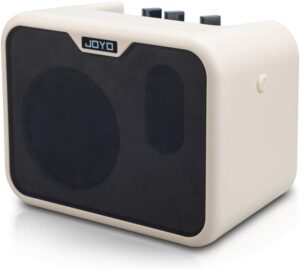
But first – what is a guitar amplifier?
Guitar amplifiers strengthen the electrical pickup signal from a guitar. In fact, the amplifier can have an even bigger impact on the ultimate sound than the guitar itself. For beginners and savants alike, choosing the right amp is key. Each guitar amp produces a different, unique sound so it’s important you make an informed decision.
Why does a musician need an amplifier anyways?
While guitars can technically create sound without an amp, the amplified sound is pretty crucial to the instrument’s effect. It is only when you plug an electric guitar into an amp that you realize its full potential.
What makes a great guitar amplifier:
When we chose our list of best guitar amplifiers, we looked at the following defining characteristics:
Electronic quality
Before identifying the true electronic quality of an amp, it’s important to outline the two major types of amplifier:
- Tube amplifier: these amplifiers tend to need a bit of turning up for the sound to really come alive. They are touch sensitive, which means with each adjustment, you can really feel the difference in the volume and the sound. They use filaments which need replacing every so often.
- Solid-state/digital amplifier: these amplifiers really get going as soon as they’re turned on. While the sound is usually crisp, it may be harder to spot the tiny nuances. Solid-state amps typically require a little less maintenance.
Sound quality and features
Sound quality is perhaps one of the most important characteristics to look for when making your amp selection. In general, you want to be sure that the volume is loud and that the sound is pure. Twist some knobs on the amp and you should arrive at the sound you’re after easily.
While tone and volume are important when it comes to sound, you may be after a few other additional features. This includes extras like digital reverb or recording outputs. If you’re someone who likes to play with a variety of tones, you may want to consider a multichannel amp. Some of the latest features include compatibility with smartphones and Bluetooth.
Speaker quality
Speaker quality is not to go remiss. It’s one of the most crucial elements of any guitar amplifier. Different speaker sizes have different tonal characteristics and quality. Small speakers tend to produce a more contained sound while large speakers have a more robust intensity.
Size for use
Are you playing or recording at home or do you need your amp for live gigs? This is one of the most important questions to ask yourself when deciding on how big you need your amp to be. If you play in a band, 10 watts is probably too small. 100 watts, on the other hand, is far too big for jamming out in the living room. We recommend something in the middle for the most versatile use.
Best Overall Guitar Amplifier

This Spark Guitar Amp has everything a 21st century musician needs to get up and running. We’d even go so far to call it smart. Its 40 Watt combo includes everything from tone stack controls to a built-in tuner, and tap tempo.
Features
The software that the speaker uses gets to know your playing style and generates sounds from a bass or drums to accompany you. Spark’s corresponding smart app lets you import your music from Spotify, Apple Music, or Youtube and it displays chords as you play. You can also track your own genius using the PreSonus Studio One Prime recording feature.
Best Acoustic Electric Guitar Amplifier

The 15 watts of this amplifier produce high-frequency sound. There are two channels for both an instrument and a mic, each with individual volume controls. On top of all that, Fender’s five year warranty has got you covered for the long-haul.
On the road again
This guitar amplifier is reasonably light, making it great for use on the road, in a small venue, or around the home.
Best Electric Guitar Amplifier

This is another great option when it comes to portability and functionality. The headphone jack allows practicing without disturbing anyone around you. If you’re living in an apartment but need to practice this amp is a great pick. Last but not least, the controls are easy to use and ideal for beginners.
Classic Fender aesthetic
This amp encompasses all that makes Fender so great. It packs a large punch in a small package. Aside from that, the silver grille cloth, amp knobs, and Fender logo give it that aesthetic that any new or experienced guitarist is after.
Best Wireless Guitar Amplifier

This amp has enough power to serve the studio or a venue. It uses high-density wood for sturdiness and portability. It is surprisingly light for its intensity. After a charge, it lasts from eight to ten hours.
This amp is particularly great for acoustic-electric players due to its 1.8-inch tweeter and titanium film diaphragm. If that’s not enough, the amp also has a unique wave purity circuit, which means it lessens energy consumption without comprising sound.
Bluetooth equipped
There is an option for wireless connection, phone input, and USB plugin. This makes it useful when using headphones, recording, or with other MP3 functions.
Best Practice Amplifier

This amp offers great value for its money. The Aux In Jack is great for connecting to a smartphone and for playing backing tracks while you practice. Use the amp with batteries or with the attached power adapter. It builds just the right amount of volume for practice or for play with an acoustic band. Aside from practicing, it’s also great for hitting the road.
Light and lean
Clocking in at an impressive 4 pounds, this is the amp of a lean traveler’s dreams. One reviewer even said that “it’s smaller than a toaster but still fills a room with sound.” There are subtle strap buckles on both sides of the amp so you can hang it easily over your shoulder when in-transit. It is ideal for street performers or for propping up on pretty much any surface.
FAQs about Guitar Amplfiers
How do I know which amplifier is best for me?
Aside from looking for the obvious things like overall quality and size, it’s really a matter of what the musician likes to hear out of their amplifier. If you’re not totally sure, we recommend looking at some of your musical inspirations. The amplifier they use might be a surprise.
Does the size of the speakers matter?
Typically smaller size speakers produce higher frequency sounds. For a super large rock sound, look for large speakers.
How long do guitar amps last?
Tube amps require tube replacement of the tubes themselves every one to two years, but the amps will last well past 20 years with consistent maintenance. Solid-state or digital amps typically have a 30 year life span, even with daily play.

